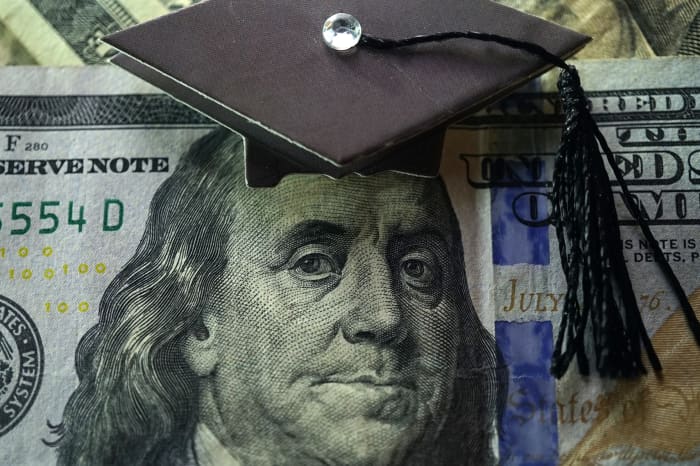‘The college kicked him out.’ My son failed out of pharmacy school after amassing $126K in student loan debt. Is there any way to pay less?

How to get out of student loan debt
Getty Images/iStockphoto
Question: My son was studying in a pharmacy program and at the end of the last semester, the college kicked him out due to his non-performance in academics. He owes is $126,000. The interest rates are from 8.5%, 5.5% and 4% (average is about 6.5%). Now he is not studying anything. I have the following questions: Is there any way this student loan will be canceled or forgiven? Is there any way we can postpone payment after May 1, 2022? Is there any way to reduce the interest rate? Since he has no job, is there any way to waive/cancel/forgive the debt?
Answer: We’re not going to sugarcoat that your son is in a tough spot: Having student loans, no degree, and no job presents a serious challenge to repaying your debt. “The debt is unlikely to be forgiven unless you meet the criteria for one of the existing student loan forgiveness programs, such as working in public service for 10 years or if you went to a school that closed before you could complete your program,” says Anna Helhoski, student loan expert at NerdWallet. (See ways to get loans forgiven here.) (Note that refinancing federal loans will strip you of options like loan forgiveness and income-based repayment plans, so you may not want to do that; however, readers with private student loans seeking a lower interest rate may want to consider a refinance as rates are low now.)
Have a question about getting out of student loan or other debt? Email [email protected].
Income-driven repayment plans
If some of the loans are federal, you can work with what’s already offered for struggling borrowers. “This means enrolling in an income-driven repayment plan that ties payments to a portion of your income and extends your repayment period,” says Helhoski. For federal student loans, an income-driven repayment plan determines your monthly payment based on a percentage of your discretionary income and lasts 20 to 25 years, with the loan balance being forgiven after that. This could lead to payments of $0, she adds.
Deferments and forbearances
Another option is “pausing payments by applying for an unemployment deferment or a hardship forbearance,” says Helhoski. (See details on those here.) However, she points out that pausing payments or applying for unemployment forbearance are best used for short periods of time since interest will continue to accrue and would increase the total amount you owe whenever you do start repaying.
How to handle private loans
For private loans, the best first step is to call the loan servicer and try to get them to work with you on your payments. You might also be considering refinancing to a lower rate, but “I’m guessing it may be hard to refinance the loan if your son isn’t currently employed,” says certified financial planner Lisa Weil.
And whatever you do, Matthew Jenkins, chartered financial analyst and certified financial planner at Noble Hill Planning, says, “Don’t cosign any student loans for your son.” This advice is meant to protect your retirement and finances in the event he remains unable to pay back loans, in which case you’d be on the hook for the payments as a cosigner.
Other things your son may want to do now
That said, there are other good options for your son at this point, pros say. He should try to get a job so he can repay the loans. What’s more, because finishing the pharmacy program and obtaining a degree may represent the best path forward financially for your son, the second option he may want to consider is to contact the school to determine what resources exist to help him get readmitted and back in good academic standing. “He might also consider transferring to another pharmacy program if finishing the first program is not possible,” says Jenkins. That said, if there’s a chance he will fail out again, this might not be the best path forward.




